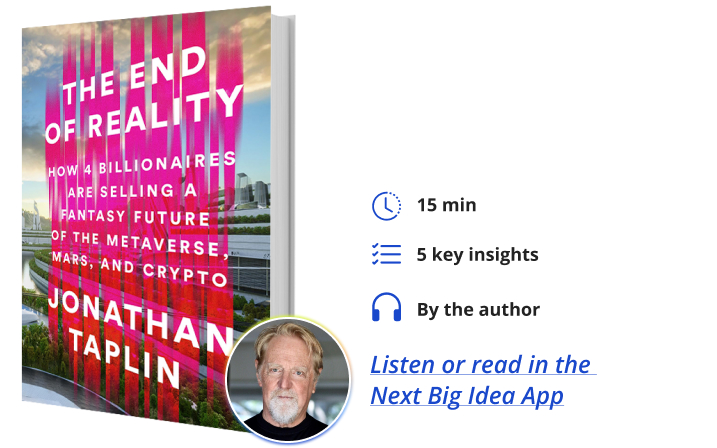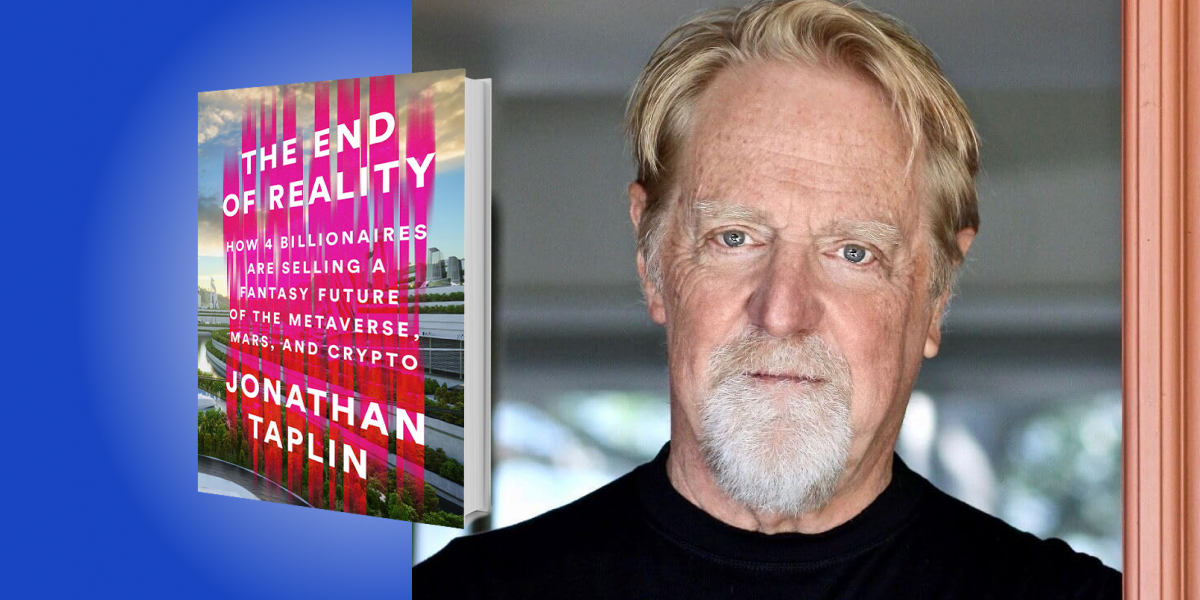Jonathan Taplin started his working life as the tour manager for Bob Dylan and The Band. He produced the Concert for Bangladesh for George Harrison and then went to Hollywood where he produced Martin Scorsese’s two early movies, Mean Streets and The Last Waltz. Over the next forty years, he produced more movies, ran the media mergers and acquisition group for Merrill Lynch, started the first streaming video-on-demand company, and was a professor at the University of Southern California, and the Director of the Annenberg Innovation Lab.
Below, Jonathan shares five key insights from his new book, The End of Reality: How Four Billionaires are Selling a Fantasy Future of the Metaverse, Mars, and Crypto. Listen to the audio version—read by Jonathan himself—in the Next Big Idea App.

1. We are in a battle between nature and the machine.
Elon Musk, Peter Thiel, Mark Zuckerberg, and Marc Andreessen all grew up in the libertarian church of Ayn Rand, who said, “If any civilization is to survive, it is the morality of altruism that men have to reject.” If we are to inquire how we got to a place of radical income inequality and the looming potential for a second American Civil War, we need look no further than these four. They created social media, where online mobs create chaos, spark runs on stocks, and drag tens of millions of people down the rabbit holes of conspiracy theories. For that, we reward them with billions of dollars.
I use the term techno-determinism to describe the path these men have dictated for us. The future they are now selling—a world run by Artificial Intelligence, crypto fortunes, living to two hundred years old, spending our lives in the Metaverse or on Mars—is mostly hype. But because of their wealth, people are buying into a dangerous future.
I believe that the ultimate goal of these prophets of modernity is to replace nature with technology—to rebuild our society in such a way that a few of them might fulfill the most primal human dream: to become gods. When Ray Kurzweil, who has promoted the idea of the Singularity (the moment when artificial intelligence will surpass the brain power of humans and will be able to evolve on its own), was asked if he believed in God, he replied, “Not yet.” But by 2045, Kurzweil believes we will have entered “the age of spiritual machines,” where humanity will no longer be the most intelligent or the dominant species on Earth.
“The rise of AI as a cultural creator will lead only to mass mediocrity.”
Right now, thousands of Hollywood actors and writers are striking because the question of whether art will be created by men or machines is up for grabs. I am sure that an AI Chatbot will never create the kind of work of genius that has moved our culture forward over the millennia. The genius of a William Shakespeare or a Bob Dylan relies on originality, but AI operates on the theory that all the possible original ideas in the universe are already contained in the data sets they have ingested from the Internet. There is nothing original about its output. The rise of AI as a cultural creator will lead only to mass mediocrity.
To understand the political and societal danger lurking in the Technocrats’ schemes, we should recognize that there are two views of America’s future on offer. One argues that the collective investment priorities of our society should go towards solving issues like the climate crisis, the mental health emergency, and the lack of affordable housing. But the other view, the one held by the Technocrats, is much darker. In this version of the future, artificial intelligence and robots (ruled by the Technocrats) will do most of the work and a large portion of the population will sit at home, living a fantasy life in the Metaverse, subsisting on government-paid crypto Universal Basic Income. Anyone who thinks this is some kind of dystopian fantasy should visit Amazon’s Research & Development facility to see the future of whole warehouses operated by five humans and 5,000 robots.
2. Truth matters.
As Yale Professor Timothy Snyder has said, “To abandon facts is to abandon freedom. If nothing is true, then all is spectacle. The biggest wallet pays for the most blinding lights.” It is a fact, not an opinion, that Bill Gates did not mastermind a plot to embed microchips into Covid vaccines so that Americans could be tracked and their minds controlled. But polls indicate that about one-fifth of all Americans believe the microchip conspiracy theory or are unsure whether it is true. Most of that disinformation comes from the social media sites controlled by Mark Zuckerberg and Elon Musk.
Elon Musk has built his companies on hype. He estimates it will cost at least $10 trillion to build the first colony on Mars, most of which would come from you, the taxpayer, funneled through NASA to Musk’s Space. Musk ignores the fact that we would have to transport all our oxygen to live on Mars. For years, scientists and engineers in the space program have cynically stated, “No Buck Rogers, no bucks.” What they meant was that Congress would not appropriate the billions of dollars they wanted unless humans piloted the missions. There may be things to learn from excavating the lifeless surface of Mars, and we are already doing this with the Mars Rover programs. But sending a manned mission to Mars is a pointless ego trip for a man like Musk, and a $10 trillion burden on the American taxpayers when there are so many other pressing issues. So why does Elon Musk persist in his notion of putting a million people on Mars in the next decade?
“Musk’s plan for a permanent human settlement on Mars would be the most expensive construction project ever undertaken.”
A simple answer might be money. Musk’s plan for a permanent human settlement on Mars would be the most expensive construction project ever undertaken. Space X has been making a near 30 percent profit margin on its work for NASA over the two-year period of 2018 to 2020, so a Mars mission would create a $2 trillion profit for Musk.
As Edward Niedermeyer, author of the definitive book on Tesla, wrote, “His ability to repeatedly sell such science fiction fantasies to a credulous public is the foundation for a vast empire and fortune.”
3. Is this really a culture war?
We are told we are fighting a culture war. If there was a culture war in 1966, we didn’t pay any attention to it. Sure, plenty of people said, “Why don’t you get a damn haircut?” or “Turn down that awful music,” but we paid them no mind. By contrast today we are fighting an epic culture war over an algorithm-driven mass culture, the majority of which is both decadent and trivial. In culture, as in politics, there are revolutionary and non-revolutionary periods. Whereas the 1960’s were revolutionary in both, our current period is revolutionary in neither.
Social media is set up to create outrage, so the algorithms advance the most outrageous posts from either side of this phony war. A recent New York Times headline noted that “G.O.P. voters were tiring of the war on wokeism,” noting that more than 50 percent of Republicans support gay marriage. A Republican bill introduced in the Senate last year “calls for hiring more people in the immigration agencies to address spikes in migration and speeding the process for determining an asylum case in immigration court.” There is a middle ground to be found and campaigned for on all the cultural issues, but our current media system, dominated by social media, prevents us from finding it.
Today the core attributes of our culture are narcissism and escape. In a recent interview about The Metaverse, Zuckerberg said, “Part of it is, we’re building out this avatar system that is going to get increasingly expressive on the one hand, and then if you want, also increasingly realistic. Although I think not everyone wants to be exactly realistic all the time, so you want to kind of offer both expressive and realistic.” His use of the term “expressive” to mean “make me look like Kim Kardashian” is quaint. I can see the avatar creators and the plastic surgeons having a symbiotic relationship in the 2030s. Research has already proven that couples who meet in VR are reluctant to meet in person. Clearly, they want to be represented by their “expressive” avatar rather than their “realistic” self.
“There is a middle ground to be found and campaigned for on all the cultural issues.”
History has proven that fantasy is both a brilliant marketing tool and a powerful political tool. The Technocrats are employing it in both spheres. In the commercial realm, Musk floats the notion that we will escape our planet’s inevitable extinction by building a new civilization on Mars. Mark Zuckerberg promises escape from dreary reality by putting on the Meta Quest VR helmet. Andreessen suggests we can fight wars without human casualties with the autonomous weapons he is developing, and you can get rich just by purchasing the Bored Ape NFTs he is selling. And Thiel markets the greatest fantasy of all—you can live forever.
4. Technology can help or hinder our future.
I am not a Luddite. I know that Artificial Intelligence is better at reading mammograms than humans. Five years ago, Los Angeles voters approved a $1.2 billion bond issue to house the homeless. The city has approximately 45,000 homeless citizens. This year the city controller reported that the city has built 8,091 housing units at an average of $596,846 per unit. Fourteen percent of the units exceed $700,000 per unit and one project topped $800,000. This is for low-cost housing!
Two years ago, in Austin, Texas at the South by Southwest Festival, an American startup named ICON demonstrated the production of a 650-square-foot home that was 3D-printed out of concrete in under 24 hours using a mobile printer. The total cost of materials and labor was $4,000. Even if they ended up costing $50,000 per unit, it would be an extraordinary savings from the braindead process the city is now using to solve its housing crisis. An additional $1 billion (on top of the $1.2 billion bond offering) could have created the 40,000 housing units the city needs.
5. Are you part of the problem or part of the solution?
The solution to this dilemma does not necessarily lie with a new set of government regulations on AI or social networks. Our task is to ask ourselves whether we want to continue down this road of techno-determinism and surveillance capitalism or whether we want to join the resistance movement. I see that movement every day on the picket lines around Hollywood studios. I hear that resistance every day when I listen to the songs of Rhiannon Giddens or T Bone Burnett. I see that resistance in the 10,000 signatures on the Authors Guild letter to the AI Barons asking to be paid when their AI systems “train” on their books. You can be part of that movement as well. Don’t buy crypto. Take a day off each week to observe a digital Sabbath, where you and your family put your mobile devices in a locked box for a day. Don’t fall for the Metaverse hype.
In thinking about our desire for a brighter future, I was reminded of a quote from Albert Camus’ The Rebel, his long meditation about the role of artists and their audience in resistance movements. He wrote, “We are at the extremities now. At the end of this tunnel of darkness, however, there is invariably a light, which we already divine, and for which we have only to fight to ensure it’s coming. All of us, among the ruins, are preparing a renaissance beyond the limits of nihilism.”
To listen to the audio version read by author Jonathan Taplin, download the Next Big Idea App today:
































